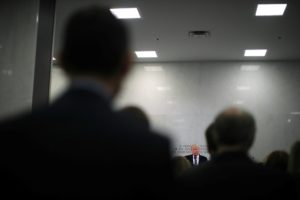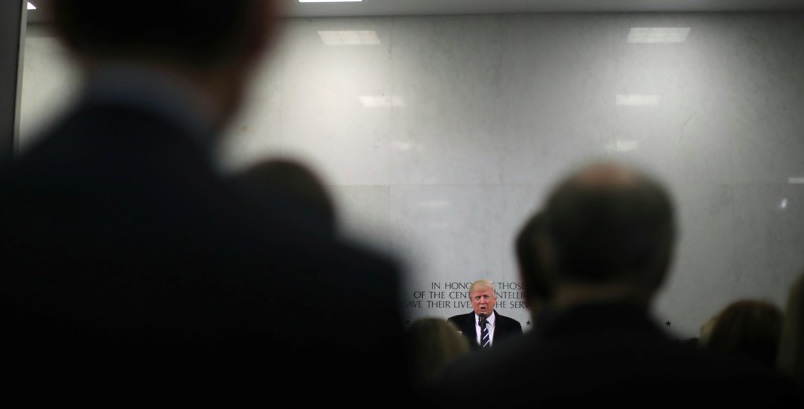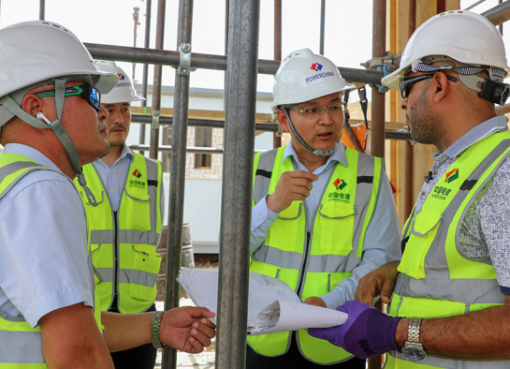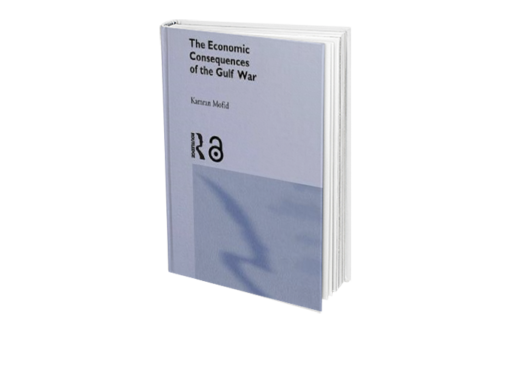
Taking it, as Donald Trump has mused about doing, is not only illegal—it would tear the country apart.
On his first full day in office, Donald Trump stood before the CIA’s Memorial Wall, which commemorates the agency’s fallen officers, and railed against the media, boasted about the size of his inauguration-ceremony crowd, and took the opportunity to restate his conviction that “we should have kept the oil” in Iraq—a reference to America’s apparent failure to claim the country’s fossil fuels as its own following the 2003 invasion and subsequent war. “Maybe we’ll have another chance,” he mused, drawing laughter, reportedly from his own staffers in the room. But there is nothing amusing about Trump’s proposal, originally aired on the campaign trail and dismissed as something between a pipe dream and a war crime.
Trump’s nonchalant re-airing of the idea betrays a dangerous ignorance of Iraq’s petro-politics, which for years has both bound the country together and threatened to tear it apart. Petrodollars underpin the Iraqi economy, but as the country struggles to fund the war against the Islamic State, it has none to spare. Trump’s threat strikes at some of the most sensitive political fault lines in the country. And if he follows through, it may prove detrimental, not just to Iraq, but to two of Trump’s other stated policy objectives: defeating ISIS and supporting the Kurds.
How Trump’s Speech to the CIA Endangered America
Baghdad’s control of Iraq’s provinces is, in part, based on its custodianship of the country’s petrodollars, with the oil sector contributing up to 99 percent of government revenue. The war against ISIS, however, forced the government to divert huge sums of money to the army, as well as to the salaries of 110,000 fighters from the Popular Mobilization Forces in November, in a bid to rein in Shia paramilitary groups. This siphoned much-needed revenue from the provinces.
“We have not received any petrodollars from Baghdad since 2014. … Baghdad owes us hundreds of millions, and they owe Basra many times more,” Dr. Najmaldin Karim, governor of the northern Iraqi region of Kirkuk, told me. It is the same all over the country, as Nisayf Jasim al-Khattaby, president of the provincial council of the southern province of Karbala, explained. “We do not receive as much from the central government,” al-Khattaby said. “The main problem is the weak economy; the budget assigned to us is smaller than it should be.” As a result, Baghdad’s authority has fractured, as demands grow for federalization and the devolution of power to the provinces.
Petrodollars are particularly scarce in the Kurdish capital of Erbil. At the annual CWC Kurdistan-Iraq Oil and Gas Conference, held in London, a candid Qubad Talabany, the deputy prime minister of the Kurdistan Regional Government (KRG), said the government’s monthly operational deficit was over $460 million by the beginning of 2016. Kurdish civil servants, and even the peshmerga, have gone without pay for months as the government has sought to slash salaries. One peshmerga commander told me he could barely afford to replace his men’s threadbare shirts. The KRG is also months behind on payments to the oil companies operating within its borders.
But the economic outlook for the Kurds could improve this year, thanks in part to an oil deal struck with Baghdad in August 2016 that allows oil to be exported from the field in Kirkuk and splits the resulting revenues evenly between Baghdad and the KRG. When ISIS routed the Iraqi army from Mosul in 2014, Kurdish peshmerga moved to protect Kirkuk from the militants. In doing so, the fighters also took control of Iraq’s largest oil field. The ensuing dispute with Baghdad saw oil exports from the field stop completely, until last August’s oil sharing agreement.
But the deal was thrown into doubt by OPEC’s surprise decision last November to cut production in a bid to drive up sagging global oil prices. Iraq, as a member of OPEC, received a quota that capped its total exports, turning oil exports into a zero-sum game between Baghdad and Erbil. Now any increase in exports for Baghdad will come at Erbil’s expense, and with Baghdad desperately in need of money for reconstruction and security in territory liberated from ISIS, both sides are gearing up for a confrontation. “The basis for the good will created by the oil sharing agreement is quickly disappearing,” observed Michael Knights, a fellow at the Washington Institute.
Trump’s threat strikes at some of the most sensitive political fault lines in the country.
If cooperation between Baghdad and Erbil broke down, disaster would ensue. The landlocked KRG depends on good relations with its neighbors in order to export oil. For the Kurdish economy to thrive, the oil must flow. “You can’t go independent when you’re bankrupt,” Talabany noted. A breakdown would also provide an opening for ISIS. “How do we prevent [ISIS] rebuilding itself under a new name?” asked Dr. Hanan al Fatlawi, an Iraqi member of parliament on the foreign affairs select committee. “We have to rebuild the trust between the components of Iraqi society.” Post-liberation reconstruction is expensive, as is providing security as communities attempt to reintegrate. “Security is paramount and without security you cannot go on,” Governor Karim said. All of this is dependent upon Iraqi petrodollars.
Catastrophe is avoidable, however. Dr. Ashdi Hawrami, the KRG’s Minister for natural resources, emphasized his commitment to cooperation with Baghdad. “There is no question that we will be having a dialogue and cooperation,” he said. Iraqi Prime Minister Haider al-Abadi will need to take a firm hand with the Kurds ahead of upcoming Iraqi elections, but he has a good relationship with the KRG. And all parties agree that a break in relations would spell mutual disaster.
It is into this delicate situation that Trump has pitched himself, without apparent regard to the consequences. That his threat to strip Iraq of its oil survived his transition into the White House demands careful consideration of what the proposal could actually entail. The U.S. military would not, as Trump has suggested, occupy Iraq to oversee the illegal extraction of crude from its oil fields, which are dispersed across the country. But in light of Trump’s other stated priorities that does not mean he will not move to try and extract money from Baghdad. He could seek to deliver on his suggestion that Washington should “reimburse” itself for some of the costs of its military operations in Iraq by negotiating Iraqi payments in crude for America’s substantial provision of arms, training and direct military assistance.
Or he could just push the Iraqi government to award favorable contracts to American companies like ExxonMobil, whose former CEO Rex Tillerson has just been confirmed as secretary of state. Tillerson’s previous escapades, of course, present a cautionary tale. Under Tillerson, ExxonMobil purchased oil rights to land blocks controlled by the KRG in 2011—a deal that directly challenged the authority of the Iraqi government and was partially responsible for an armed stand-off between the Iraqi army and the Kurdish peshmerga.
Tillerson’s record of aggressively asserting corporate interests into decidedly thorny diplomatic climates also reflects the lack of common purpose among Trump’s team. James Mattis, Trump’s secretary of defense, has a record of seeking to confront Iran’s growing influence in Baghdad. Destabilizing Iraq’s oil sector would weaken Baghdad’s hold on the country, thereby strengthening Iran’s position. Trump has established a reputation for letting his staff compete, rather than collaborate, and in Iraq this risks seeing the Pentagon and Foggy Bottom pursuing contradictory positions, just as tensions in Iraq reach their height.
What is indisputable is that for Trump to wade into this minefield demanding a cut would be destabilizing. It would, as Edmund Burke once described British efforts to recoup the costs of a foreign war from the people of the United States, be “to tax where no revenue is to be found,” and the result would be comparably volatile, destroying the KRG’s relations with its neighbors, stripping resources from Baghdad’s peace dividend and helping ISIS to prolong its insurgency.
Source: The Atlantic, January 25,.2017
https://www.theatlantic.com/international/archive/2017/01/trump-oil-iraq-kurds-isis/514352/








Comment here